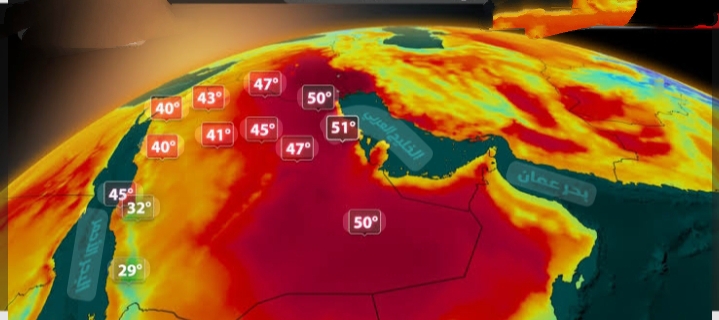Something strange is happening in the skies above us. Across continents, the heat is no longer just seasonal—it's transforming into a serious global concern. Temperatures are soaring, shattering old records, and raising urgent alarms about the state of our environment. Among the worst-hit regions is Saudi Arabia, where the heat has reached unprecedented, almost surreal levels. Just this week, the city of Dammam in eastern Saudi Arabia recorded a temperature of 49.3°C (120.7°F)—in the shade. Experts estimate that if measured in direct sunlight, this could exceed 55°C, a dangerously high figure. According to renowned Saudi meteorologist Dr. Abdulaziz Al-Hussaini, the combination of intense heat and coastal humidity makes it feel even hotter. This “feels like” temperature can have serious health implications, especially for vulnerable populations. But this isn’t just another summer heatwave—this is part of a much broader climate shift. Experts warn that what we’re witnessing is not merely extreme weather, but a climate emergency. From human health to agriculture, infrastructure to economies, every layer of society is feeling the pressure. Adding to the severity of the situation, Saudi Arabia has now entered a traditional weather phase known as “Ayyam Al-Jawza”—a 26-day period marked in ancient Arab traditions as one of the harshest times of the year. Beginning on July 3rd, this season is astrologically linked to the appearance of two stars—“Al-Haqa” and “Al-Hanna”—which ancient Arabs used to predict the intensity and duration of the summer heat. During Ayyam Al-Jawza, hot, dry, and toxic winds sweep across the land. These winds were historically feared for their devastating impact on both humans and animals. In ancient times, people would avoid travel, shelter their livestock, and refrain from outdoor activities altogether. The winds were believed to carry illnesses and intensify the already scorching climate to unbearable levels. Today, despite the modern comforts of air-conditioning and advanced cooling systems, the challenges remain significant. Dr. Al-Hussaini warns that the increased demand for electricity during these extreme days could overwhelm power grids. In areas where power cuts occur, the consequences could be dire, especially for outdoor workers, the elderly, and those with medical conditions. So, what can be done? Public health experts are urging people to take serious precautions. Stay indoors during peak sunlight hours, remain well-hydrated, wear light clothing, and avoid unnecessary outdoor activity. Employers are advised to reduce outdoor labor during midday, while authorities may need to bolster emergency services to respond to heat-related health crises. These are not just hot days—they are a test of human resilience and awareness. The current crisis is a powerful reminder that climate change is no longer a distant threat—it is here, and it is real. What’s happening in Saudi Arabia today could happen anywhere tomorrow. As we navigate these boiling days, one thing is clear: nature is sending us a message. It's up to us to listen, adapt, and protect ourselves and our planet.
Scorching Reality: Saudi Arabia Breaks Heat Records Amid Global Climate Alarm
Life Style and EntertainementJul 4, 2025 · Author: Uzma

Photo
13
110
Related Articles

Variety of Roses – Nature’s Colorful Masterpieces
Author: Uzma

Abdul Faseeh Pakistani Rising star
Author: Uzma
